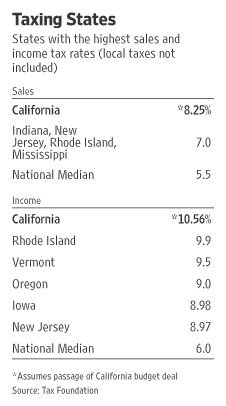The Wall Street Journal | February 17, 2009
If you thought Washington’s stimulus debate was depressing, take a look at the long-running budget spectacle in California. The Golden State’s deficit has reached $42 billion, Governor Arnold Schwarzenegger is threatening to furlough 20,000 state workers (go ahead, make our day), and as we went to press yesterday Democrats who control the legislature had blocked lawmakers from leaving until they finally get a deal.
It’s sad to watch. The Golden State — which a decade ago was the booming technology capital of the world — has been done in by two decades of chronic overspending, overregulating and a hyperprogressive tax code that exaggerates the impact on state revenues of economic boom and bust. Total state expenditures have grown to $145 billion in 2008 from $104 billion in 2003 and California now has the worst credit rating in the nation — worse even than Louisiana’s. It also has the nation’s fourth highest unemployment rate of 9.3% (after Michigan, Rhode Island and South Carolina) and the second highest home foreclosure rate (after Nevada).
Roughly 1.4 million more nonimmigrant Americans have left California than entered over the last decade, according to the American Legislative Exchange Council. California is suffering more than most states from the housing bust, but its politicians also showed less spending restraint during the boom.
It’s sad to watch. The Golden State — which a decade ago was the booming technology capital of the world — has been done in by two decades of chronic overspending, overregulating and a hyperprogressive tax code that exaggerates the impact on state revenues of economic boom and bust. Total state expenditures have grown to $145 billion in 2008 from $104 billion in 2003 and California now has the worst credit rating in the nation — worse even than Louisiana’s. It also has the nation’s fourth highest unemployment rate of 9.3% (after Michigan, Rhode Island and South Carolina) and the second highest home foreclosure rate (after Nevada).
Roughly 1.4 million more nonimmigrant Americans have left California than entered over the last decade, according to the American Legislative Exchange Council. California is suffering more than most states from the housing bust, but its politicians also showed less spending restraint during the boom.

The tax increases will continue to chase even more productive people out of the state. For at least two years, the sales tax would rise by one percentage point to 8.25% and the income tax by 0.3% to a top marginal rate of 10.56%. These will both be the highest statewide rates in the nation (see chart).
Do these taxes hurt business? Ask Hollywood. Film makers are threatening to flee to avoid the state’s high costs, so to keep them in Southern California the deal offers $500 million in tax breaks for producers. Rich liberals like Rob Reiner, who love higher taxes on other people, get a sweetheart tax break and everyone else pays more.
Mr. Schwarzenegger is finally getting a constitutional state spending cap that will be on the ballot in the next election, but even that is flawed. This cap would limit spending hikes in any year to a rolling average of the percentage increase of the past 10 years. Nice idea, except that if Californians vote yes, the higher income and sales taxes automatically kick in for three more years. So to get a modicum of spending restraint, the voters have to agree to tax themselves by $25 billion more for three additional years. Californians can be forgiven if they say “no deal.”
The tragedy of this gamesmanship is that the political class still won’t address the root cause of its financial problems, which is that the state is becoming less economically competitive. California businesses and high-income families already pay a surtax for locating inside the state. The new budget deal raises that tax toll higher still.
It’s no surprise that most CEOs we talk to, many of whom live in California, say they’d be foolish to build another plant in the state. California’s budget crisis is the inevitable result of runaway liberal governance, and the state’s voters will keep paying for it until they reduce their tax burden and adopt more radical spending controls.
. . . more

Thank you for your article.
I have taken notice, I recognize the decline and poor management to say the least.
Decisions made by many have caused this decline unfortunately.
Keep writing.
Best wishes.